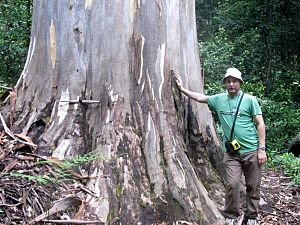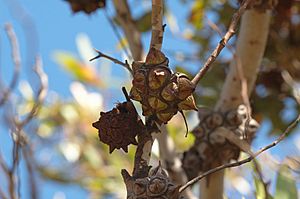Currency Creek Arboretum facts for kids
Quick facts for kids Currency Creek Arboretum |
|
|---|---|
| Type | Eucalypt arboretum |
| Location | Currency Creek, South Australia |
| Area | 32 ha (79 acres) |
| Created | 1992 |
| Operated by | Private |
| Open | By appointment only |
| Website | http://www.dn.com.au/index.html |
The Currency Creek Arboretum (also called CCA) is a special place in South Australia. It is near a small town called Currency Creek, which is south of Adelaide.
This arboretum is like a big outdoor museum for trees. It focuses only on Eucalypt trees, which are native to Australia. The CCA covers about 32 hectares (that's like 80 football fields!). It is also a research center where scientists learn more about these amazing plants.
The Currency Creek Arboretum is owned and run by private individuals. It is looked after by volunteers and does not have any paid staff. You need to make an appointment to visit, and there is no entry fee.
Contents
History of the Arboretum
How the Arboretum Started
In 1990, a scientist named Dr. Dean Nicolle started looking for the perfect piece of land. He wanted to create a special place for eucalypt trees. He needed soil that was well-drained, had no limestone, and was slightly acidic.
He found the right spot, and the Currency Creek Arboretum was officially started in 1992. The area has a Mediterranean climate, which means it has warm, dry summers and mild, wet winters. It gets about 450 millimeters of rain each year.
Planting the First Trees
The very first eucalypt seeds were planted in 1993. There were 18 different types of eucalypts planted that year. Dr. Nicolle made sure to record exactly where each seed came from using a GPS. He also collected plant samples for a special collection called an herbarium.
Over time, they learned the best way to plant the trees. Some trees were planted too close together at first, so they have been moved to give them more space to grow.
What's in the Collection?
The Currency Creek Arboretum has an amazing collection of eucalypts. It includes over 1,000 different species and subspecies of trees. In total, there are more than 8,000 trees growing there!
The collection features not only Eucalyptus trees but also Angophora and Corymbia. These are all types of trees that are closely related to eucalypts. Each different species is planted in groups of four, making it easy to study them.
Important Research
The scientists and volunteers at the Currency Creek Arboretum do a lot of important research. They study many things about eucalypts, including:
- Conservation: How to protect eucalypt species, especially those that are rare or endangered.
- Cultivation: The best ways to grow eucalypt trees.
- Ecology: How eucalypts interact with their environment and other living things.
- Physiology: How eucalypt trees work, like how they grow and use water.
- Systematics and Taxonomy: How to classify and name different eucalypt species.
They also research how eucalypts can be useful to people. This includes looking at their use in the cut flower industry and for honey production. They also study how eucalypts can be used for firewood, to provide shade, and to create windbreaks to protect farms from strong winds.
See also
 In Spanish: Currency Creek Arboretum para niños
In Spanish: Currency Creek Arboretum para niños
 | Tommie Smith |
 | Simone Manuel |
 | Shani Davis |
 | Simone Biles |
 | Alice Coachman |



